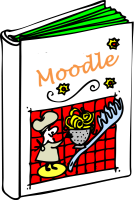Theme recipes for educators
Section outline
-

Moodle recipes for educators is a database cookbook of ideas for using Moodle in a variety of teaching contexts and levels. It was originally set up by Tomaz Lasic on moodle.org with contributions from many Moodlers worldwide. -
Below is a handful of ideas from the cookbook to give you a flavour of what's involved.
-
Students work in pairs or small groups using a standard forum. Each group creates a thread. The first student in the group posts the beginning of the story. Then the next student posts the continuation of the story. They keep passing the story to each other, sending it in new and unexpected ways.
-
"I told students 6 possible answers for the upcoming in-class essay task, 3 of which were going to be formally assessable. I wrote the questions in the EDIT mode on the main page of the wiki and enclosed each of them with [square brackets]. When I clicked 'save', this created a new wiki page for each question. Students were encouraged to collaboratively create the best possible answer."
-
Students create "narrated" powerpoint presentations about an assigned accident/injury. The students upload the presentation and using the workshop feature in Moodle, they have a rubric where they assess 3 other students presentations. They also have to name 2 things they learned in the presentation. This worked great in a large class because it took about 2 weeks for students to stand up and present their material. Using this method, the students watch the presentations after class and still get the material.
-
"We have 10 to 40 hour courses that students can take 24/7 and there is no direct interaction with an instructor. We needed something to gather information about the person who was proctoring a student's final exam at a home or office location. We need the proctor to state they are ready to watch the student take the exam and understand the conditions of the Final Exam."
-
